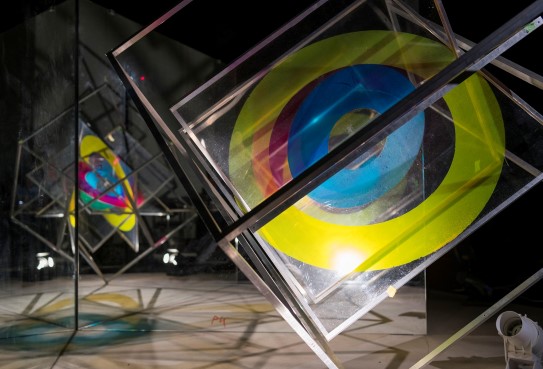Glance (audio description)
Irma Salo Jæger, Sigurd Berge, Jan Erik Vold
Transcription
Description
Blikk
Artists: Irma Salo Jæger, Sigurd Berge, Jan Erik Vold
Year: 1970 and 1990
The installation is a hanging sculpture where the framework is five aluminum cubes with large square plexiglass inside, where large and small circles are printed in the primary colors blue, yellow and red. They rotate around their own axis mounted via the corners of the cubes in the ceiling. The colors are reflected on the surrounding walls, and the movements are underlined by the sound art, poetry and music in the room.
Narrator:
BLIKK, which is the Norwegian word for glance, is a collaboration between the artist Irma Salo Jæger, the poet Jan Erik Vold, and the composer Sigurd Berge. It was created to bombard the senses with light, sculpture, movement, poetry and a hi-tech sound composition. When BLIKK was created in 1970, it was intended to be a temporary installation, and has now been put back together, piece by piece. Sigurd Berge’s original sound composition has been reconstructed by Jøran Rudi, an electro-acoustic composer and a former guitarist with the Norwegian punk-rock band KJØTT.
He is here to tell us more.
Jøran Rudi:
Sigurd Berge was one of four Norwegian composers who pioneered the use of electronic music technology. Like several others, such as Arne Nordheim and Kåre Kolberg, he travelled a lot in Europe, particularly in the Netherlands and Poland, and perhaps also to Paris, to find out what people were doing there. Afterwards, he returned home with vast amounts of knowledge and equipment. What kinds of machines did they have, and what kinds of equipment did they use? He made comprehensive lists of all this information!
What were their compositional methods? What possibilities did this technology offer?
Berge’s music for BLIKK basically falls into two categories. One is natural sounds. Berge grew up in the rural district of Gudbrandsdalen, and local sources describe how, as a young boy, he would lie on a rock in the middle of the river and listen to the water. He took these experiences with him into BLIKK, which also includes some recordings of birdsong.
But we don’t simply hear one recording at a time – the sound is layered; many layers of sound are superimposed on top of each other. The layers are manipulated slightly differently; there is a kind of depth and development in the sound that makes it clear that he has taken this material and done something to it.
The other type of music that Berge uses in BLIKK is electronic music. Once again, just as in BLIKK itself, there are systems that unfold. There are items of electronic equipment, some sequencers, some filters, and some tape recorders, making it possible to create several layers of rhythms, for example, that play themselves over time.
We find all of this – the natural sounds and the electronic sounds – mixed up with Jan Erik Vold’s readings of his own poetry.
This is the soundtrack of BLIKK.